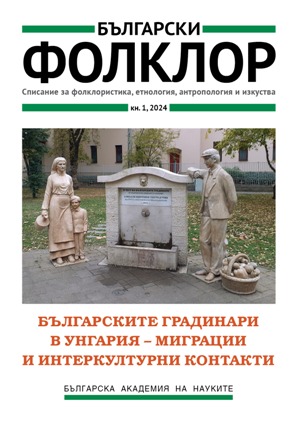Интеграция на българските градинари в местното общество. Примери от Югоизточна Унгария
Integration of Bulgarian Market-Gardeners into the Local Society. Examples from South-Eastern Hungary
Author(s): László MódSubject(s): Politics / Political Sciences, Politics, History, Anthropology, Social Sciences, Economy, Law, Constitution, Jurisprudence, Cultural history, Geography, Regional studies, Library and Information Science, Business Economy / Management, Micro-Economics, Agriculture, Energy and Environmental Studies, Human Geography, Regional Geography, Civil Law, Archiving, Electronic information storage and retrieval, Governance, Sociology, Economic history, Ethnohistory, Local History / Microhistory, Social history, Modern Age, Recent History (1900 till today), Labor relations, Economic policy, Environmental and Energy policy, Cultural Anthropology / Ethnology, Culture and social structure , Social development, Social differentiation, Demography and human biology, Human Ecology, Rural and urban sociology, Sociology of Culture, Economic development, Environmental interactions, 19th Century, Pre-WW I & WW I (1900 -1919), Interwar Period (1920 - 1939), WW II and following years (1940 - 1949), Law on Economics, Migration Studies, Ethnic Minorities Studies, Social Norms / Social Control, Human Resources in Economy, Socio-Economic Research, Sociology of Law, Identity of Collectives, Asylum, Refugees, Migration as Policy-fields, Administrative Law, Labour and Social Security Law
Published by: Институт за етнология и фолклористика с Етнографски музей при БАН
Keywords: Bulgarian market-gardeners; migration; integration
Summary/Abstract: The immigration of the Bulgarian market-gardeners to Hungary was one of the most important international economic migrations for Bulgaria in the 20th century. The paper does not intend to deal with a contemporary migration phenomenon, but rather tries to interpret the integration of the members of a special social group in the host communities in a historical context. It was not by chance that the author chose Szentes and the surrounding villages as the site of the research. This area is one of Hungary's most important vegetable-growing regions thanks to the activities and influence of the Bulgarian gardeners. The steps of the integration process can be outlined with the help of different types of sources. Its final result was that in the host communities the Bulgarians became land and real estate owners, who, after a while, sought to obtain Hungarian citizenship as well.
Journal: Български фолклор
- Issue Year: L/2024
- Issue No: 1
- Page Range: 063-074
- Page Count: 12
- Language: Bulgarian
- Content File-PDF

